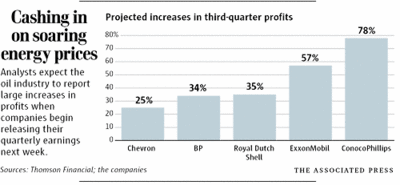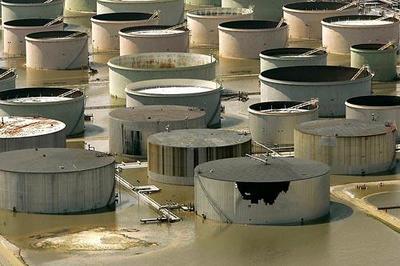
Hurricanes actually help the oil business, because the supply disruption forces an overall increase in price. All their equipment is insured, and each day that these refineries don't function or gas stations are unable to pump (and sell their gas)is also insured. Thus hurricanes are not bad for the oil industry, but they are obviously bad news for society. It's this arrangement which puts the interests of multinationals above the interests of much larger groups of individuals who support these companies by paying for their products.
Bad and harmful weather in the same way have definite costs to our lives, but not the lives of multinationals, who benefit from our increasing demand to replace what we have lost, build new homes. It's in this same spirit of destruction causing increased demand, that wars (the ultimate stimulator of demand) are conducted. Wars are good for business.
Protesters hold up these messages when protesting these issues:
PEOPLE NOT PROFITS
NO BLOOD FOR OIL
Once the price of oil reaches a certain tipping point, demand will be repelled, and consumers will be forced to modify their behaviour. In this scenario, everybody loses, but the oil companies lose least.
Hurricanes take oil firms from disaster to windfall
By STEVE QUINN
JOHN DAVID MERCER / AP
DALLAS — Offshore oil platforms were destroyed, refineries were flooded and gas stations were sporadically out of fuel.
Although hurricanes Katrina and Rita created compounding headaches for energy companies over the summer, the storms ultimately benefited them because, as supplies tightened, prices for gasoline, diesel and jet fuel soared.
Exactly how much money was made will become clearer next week, when the industry begins to detail its third-quarter performance, though analysts are expecting huge profits.
"They are just printing money right now," said oil analyst Fadel Gheit at Oppenheimer in New York. "They are making so many trips to the bank because they can't take all the money there at one time."
Exxon Mobil, Chevron, BP, ConocoPhillips, and Royal Dutch Shell are expected to report an $9 billion, or 43 percent, increase in their combined third-quarter profit, according to analysts' estimates compiled by Thomson Financial. Last year, these five companies earned $20.7 billion in the July-September period.
The windfall isn't limited to the major integrated companies that produce, refine and sell energy at the retail level.
Independent oil and gas producers, as well as independent refiners, are also expected to report double-digit profit increases. And despite indications of a slowdown in the growth rate for energy demand, the fourth quarter is already shaping up to be another good one for the industry — in part because production of oil and natural gas in the Gulf of Mexico remains hindered.
Yesterday, oil-field services provider Schlumberger said rapid growth in worldwide exploration and production and higher-priced contracts fueled a 70 percent increase in third-quarter profit. The company said its results also were hurt by recent hurricanes.
The back-to-back hurricanes have already cost the region more than 11 percent of its annual oil production (about 60 million barrels so far) and nearly 8 percent of its yearly natural-gas production (about 305 billion cubic feet so far).
However, Gheit said that because most energy producers "are covered by insurance for physical damage as well as business interruption, the negative impact on earnings is expected to be minimal."
The rising cost of energy is driving the industry's profitability jump.
The spot price for West Texas Intermediate crude oil averaged $63.19 per barrel during the third quarter, or 44 percent higher than last year, according to U.S. Energy Department estimates. Natural gas delivered at the Henry Hub averaged $9.79 per 1,000 cubic feet, an increase of 74 percent from a year ago.
The companies also benefited from rising prices for gasoline, diesel and jet fuel after the hurricane-related closure of refineries and pipelines, which instantly constrained supplies.
The industry outlook was good even before the hurricanes. There is less room for error in the U.S. energy market these days, thanks to the reduction of fuel inventories and slow addition of new refining capacity — trends that have helped make refining much more profitable in recent years.
"We're also selling record amounts of product and have been cutting costs through consolidations that further bolster the bottom lines," said John Felmy, chief economist for the American Petroleum Institute, a trade group.
The staggeringly high profits — ExxonMobil alone is expected to report an $8.9 billion third-quarter profit — could put energy firms on the defensive for making such windfall profits after a disaster.
"It's going to make people mad and it's going to be a PR nightmare for these companies," said Matthew Simmons, a Houston oil and gas investment banker.
The average retail price of gasoline nationwide briefly climbed above $3 a gallon last month. Last week, U.S. pump prices averaged $2.73 per gallon, or 69 cents higher than a year ago.
Although gasoline prices are beginning to taper off, companies and homeowners are bracing for huge increases in the cost of natural gas and heating oil this winter.
Meanwhile, watch for refiners and independent producers to weigh in with stout performances, say analysts.
Refiners such as Valero Energy, Tesoro and Frontier Oil are expected to show huge profit gains. Analysts forecast these three companies earned a combined $1.37 billion for the third quarter, a 162 percent jump from last year, according to Thomson Financial.
Independent oil and natural-gas producers will also deliver upbeat earnings, analysts said.

Copyright © 2005 The Seattle Times Company
No comments:
Post a Comment